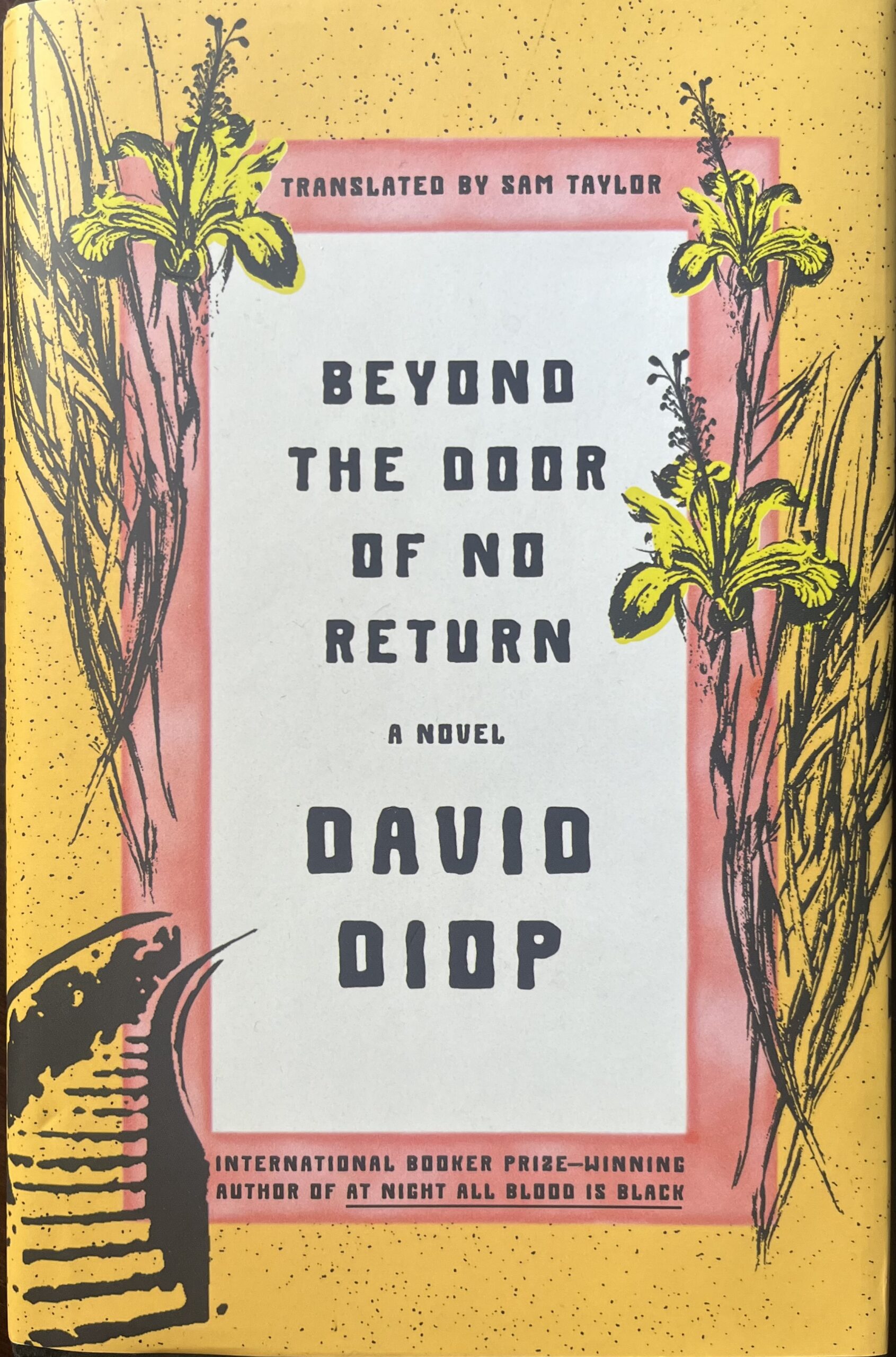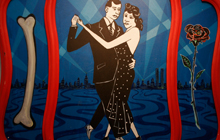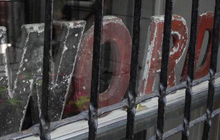Beyond the Door of No Return
David Diop. New York: FSG, 2023.
The first 112 pages are very good but the 131 pages after that are the best fiction I’ve read in recent memory. Like nothing since Chatwin’s Viceroy of Ouidah and I’m in endless admiration of the author’s accomplishment. In gorgeous translation.
A new book. I don’t sell new books but recommend them.
Pg. 113. “When I awoke, after two days of utter lethargy, a shadow stood in front of me. And whe I saw, in the hut’s half light, after my eyes had adjusted to the dazzle, the lower half of that hideous face, I thought I would faint again. Standing at the foot of my bed, a human being observed me silently, and, in the space of a second of terror, I thought an immense boa was reading itself to attack me, its mouth wide open. I sat up abruptly on my elbows and asked in a weak voice what the monster wanted of me. I received no response. It observed me, its eyes concealed under a snakeskin hood that emitted a stench of rancid butter mixed with the telling odor of burned eucalyptus bark. It was then that I realized I must be in the company of one of those healers initiated into the mysteries of the plants of their land, whose knowledge I had sought out as soon as I had learned enough Wolof to understand them. If I was conscious again, it was undoubtedly thanks to this person, and I had nothing to fear from her.
She stood motionless, staring at me with invisible eyes for a period of time that seemed very long to me. Then, as if making a sudden and irrevocable decision, she took hold of her hood in both hands and threw it back over her shoulders.
“And you – what do you want of Maram Seck?”
I thought I was hallucinating again: the woman I saw before me was young, it struck me, very beautiful despite the plastering of white earth that defaced her cheeks and mouth. Untouched by this white mask, the top half of her face revealed the profound blackness of her skin, the very fine and lustrous texture of which suggested softness. Her braided hair gathered in a high bun, and her long and slender neck, gave her the bearing of a queen of the Ancient World. The almond shape of her eyes, accentuated by their long, curved lashes, reminded me of an Egyptian bust I had once seen in the cabinet of curiosities belonging to my old botany teacher, Bernard de Jussieu. Her irises, as deeply black as her skin, clashed with the snowy whiteness of her pupils, and these extraordinary eyes were trained on me as though I were the woman’s prey. They stared, still and unblinking ass a hypnotist’s. I was intimidated and, while I hesitated to answer her question, she bent down to pick up from the floor, without taking her eyes off me, a machete, which she brought close to my head.
“If you don’t tell me who you are and why you have come here with your escort, I will cut your throat. I have no fear of death.”
“My name is Michel Adanson,” I replied instantly, “and since you have introduced yoursealf as Maram Sek, I will admit to you frankly that I came to meet you out of curiousity. I have come in the company of Ndiak, the son of the king of Waalo, to hear your story from your ow lips.”
Given the mannered novel of mid-18th century France that’s lead up and changed to Senegal, this is beyond the best scenes of as much as I could read of Marlon J’s African fantasies for not being fantasy, though I admit it’s as tricked out as any sci-fi scene while holding onto historical veracity.
“I had almost entered the priesthood in my early youth, a few years before my voyage to Senegal, and as a fervent Catholic I attached to modesty the great virtue of preventing us from too often committing the sins of the flesh. Sespite the principles of my religious education, and despite my desire to tear myself away from that horribly dangerous and beautiful sight, I could not take my eyes off Maram Seck: completely naked, she was busy lifting the lids from all the receptacles that she hoped the storm would fill with water. She had taken off her pagne. I supposed because the drenched cloth was inhibiting her movements, and now she was running around as lovely and free in her total nudity as a Black Eve not yet exiled from paradise. The rain had washed the white earthen mask from her face, revealing high cheekbones and dimples that could just be discerned on her cheeks even when she was not smiling. Her breasts, swollen with life, looked like they had been polished by a sculptor, and the slenderness of her wasist accentuated the splendid roundness of her lower back and her upper thighs. Unaware that I was spying upon. Her, she was completely uninhibited in her movements, and not an inch of her anatomy escaped my gaze, allowing me to reach the conclusion that, even though she was a grown woman, not a single part of her body bore any trace of hair.
The spectacle that she unwittingly offered me was probably over very quickly, because she soon went to another part of the enclosure. But inn the few seconds that it lasted, I reproached myself a hundred times for lacking the willpower to tear my eyes away from the myriad beauties of Maram Seck. And I went back to bed in that state, sick with desire and with shame at having abused with my eyes and thoughts this young woman who had no idea I was spying on her nakedness in that providential downpour.”
Sending the Catholic in me off to Dorcel Africa emptyhanded, but it brought to mind that lovely girl modeling Camilla’s Money Dress. Mr. Diop has roused my prurient interests here easily as much as my prescription. Altogether attractive. The author’s protagonist, Michel Adanson, botanist, is the Age of Reason’s commendable rationalist
Pg. 193. “Saint-Jean was one of those men who are obsequious towards anyone they consider superior, but pitiless when it comes to their inferiors, a rank to which I now found myself irrevocably relegated.
My pride, already ruffled by his impoliteness, could not bear the condescending irony of his question. His demeaning tone backfired, giving me in a flash all the self-assurance I had misplaced. Since he had chosen to be rude, I decided to follow suit. It that sense, we would be equals.”
Pg. 195. “I had forgotten that the color of her skin, for a man like him, relegated her to the status of a commodity in the Great Atlantic slave trade. That oversight on my part had put me in the position of being brought back to the reality of a world I detested by a man I hated.”
The governor of Gorée, as awful as the Viceroy of Ouida, in Diop’s algebra of arrogance. Really, not so far from Chatwin. Think I might read it towards comparison, or rerun Cobre Verde, if only for Kinski’s intensities.
Aphasia. Mentioned in passing, the partial or total of the ablity to articulate ideas, usually the result of a stroke, sometimes a brain tumor. I wonder if I’m not afflicted? Most times I sit down to write the words aren’t coming as I’m at a loss. What’s my Plan B? What to say to my son, what to say to Mildred, whose mental states are related to but not aphasia. We ought to form a team.
Pg. 123. “My head felt empty. Nothing interested me anymore…I realized how a place, no matter how beautiful and interesting it might be in and of itself, ceases to mean anything when it is no longer populated by our dreams, hopes and aspirations.” “The coming propitiation looms large – an angel of mercy hovering over the melodrama, even at its most dramatic” – sounds too much like negotiating the coming birthdays and holidays.

 Jumel Terrace B&B
Jumel Terrace B&B Life Turns Man Up & Down
Life Turns Man Up & Down The Private Library
The Private Library